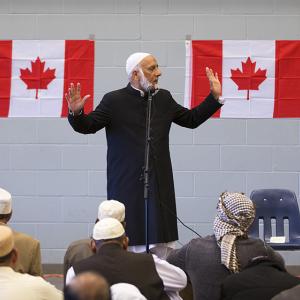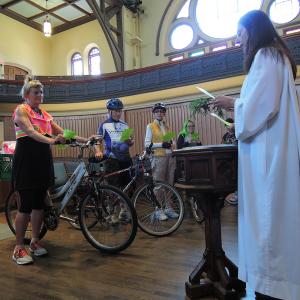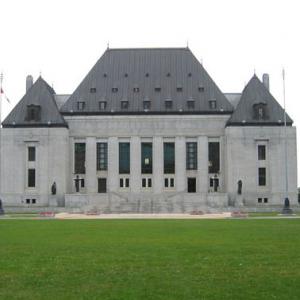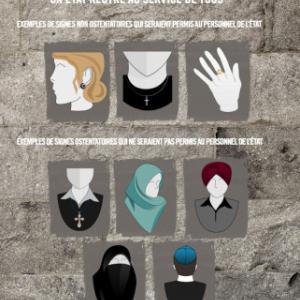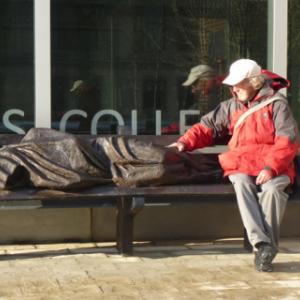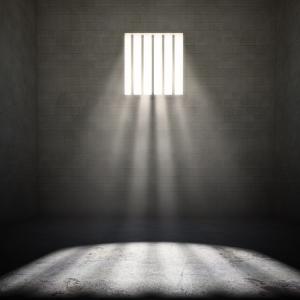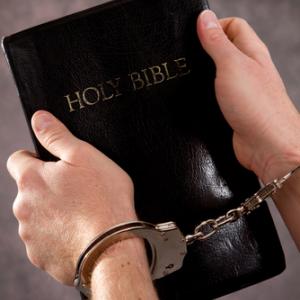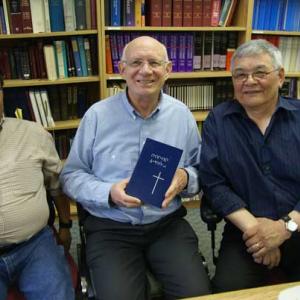Posts By This Author
Canada's Anglican Church Provisionally Approves Same-Sex Marriage Ceremonies

Image via REUTERS / Mark Blinch / RNS
Canada’s Anglican Church has provisionally voted to amend its rules to allow clergy to celebrate same-sex marriages, a day after it narrowly defeated the measure.
The General Synod will hold a second reading on the measure in 2019. If it passes, the Canadian church will join the Episcopal Church, which formally approved marriage ceremonies regardless of gender in 2015. As a consequence, the Anglican Communion placed temporary restrictions on the Episcopal Church.
Quebec Bills Aim to Prevent Islamic ‘Radicalization,’ Limit Face-Covering
The government of Quebec has introduced two bills, both aimed at Muslims.
The first would attempt to stanch the radicalization of Muslim youth through a 59-point plan that includes expanding the powers of Quebec’s Human Rights Commission to probe hate speech — enhancing training for police and teachers to recognize signs of radicalization, dedicating a police unit to patrol social media, and establishing a hotline staffed by social workers to advise families and friends of suspected extremists.
‘Blessing of the Bikes’ Helps Churches Make Climate Change a Local Issue
It was the sixth annual Blessing of the Bikes at the downtown church — a type of local event that has become more common as a growing number of churches consider the idea that protecting the environment is not just a scientific or political debate, but a spiritual one.
The movement has grown in the past decade and crosses denominations. An “Evangelical Climate Initiative” issued in 2006 has been signed by hundreds of religious leaders, and the Vatican held a one-day summit in late April to “elevate the debate on the moral dimensions of protecting the environment.” Pope Francis is preparing this summer to issue an encyclical — one of the most authoritative church documents — framing climate change action as a moral and religious imperative.
Canadian Supreme Court Rules Against Prayer at City Council Meetings
Canada’s Supreme Court has ruled that a small town in Quebec may not open its council meetings with prayer.
In a unanimous ruling April 15, Canada’s highest court ruled that the town of Saguenay can no longer publicly recite a Catholic prayer because it infringes on freedom of conscience and religion.
The case dates back to 2007, when a resident of Saguenay complained about public prayer at City Hall.
Just last year, a divided U.S. Supreme Court ruled that legislative bodies such as city councils could begin their meetings with prayer, even if it plainly favors a specific religion.
But the Canadian high court ruled that the country’s social mores have “given rise to a concept of neutrality according to which the state must not interfere in religion and beliefs. The state must instead remain neutral in this regard. This neutrality requires that the state neither favor nor hinder any particular belief, and the same holds true for non belief.”
The court said a nondenominational prayer is still religious in nature and would exclude nonbelievers.
Charter of Quebec Values Would Ban ‘Overt’ Religious Symbols
Quebec’s government this week introduced its much-discussed Charter of Quebec Values, which would ban “overt and conspicuous” religious symbols worn by government employees.
Pushing the twin ideals of secularism and separation from Canada, the Parti Quebecois’ plan would prohibit public employees from wearing large crosses and crucifixes, Islamic headscarves, Sikh turbans, and Jewish yarmulkes as a way to establish “religious neutrality” in public.
The prohibitions would apply to civil servants, teachers, law enforcement officers, firefighters, doctors, nurses, and public day care employees.
Soccer Ban on Sikh Turbans Leads to Backlash Against Quebec
Quebec’s decision to ban Sikh religious headgear on the soccer field is having national repercussions.
Earlier this week, the Canadian Soccer Association suspended the Quebec Soccer Federation for instituting the ban on religious head coverings, such as turbans, keskis, and patkas. Then the Ontario Soccer Association withheld travel permits for 20 Ontario teams scheduled to play in a tournament near Montreal.
Finally, on Friday, FIFA, the international governing soccer body, said it was authorizing male head covers at all levels of Canadian soccer.
Canadians Turning Away from Organized Religion
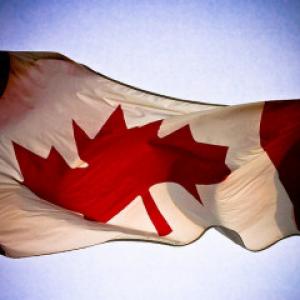
Canadian flag image courtesy Alex Indigo via Flickr (http://flic.kr/p/4eDBug)
TORONTO — A new national study shows that while Canada remains overwhelmingly Christian, Canadians are turning their backs on organized religion in ever greater numbers.
Results from the 2011 National Household Survey show that more than two-thirds of Canadians, or some 22 million people, said they were affiliated with a Christian denomination.
At 12.7 million, Roman Catholics were the largest single Christian group, representing 38 percent of Canadians; the second largest was the United Church, representing about 6 percent; while Anglicans were third, representing about 5 percent of the population.
Observers noted that among the survey’s most striking findings is that one in four Canadians, or 7.8 million people, reported they had no religious affiliation at all. That was up sharply from 16.5 percent from the 2001 census, and 12 percent in 1991.
Homeless Jesus Sculpture Searches for a Home
TORONTO — This homeless Jesus can barely find a home.
Canadian sculptor Timothy Schmalz notes the ironies in his latest creation, “Jesus the Homeless,” a bronze sculpture depicting the Christian savior huddled beneath a blanket on an actual-size park bench. Only the feet are visible, and their gaping nail wounds reveal the subject.
“If Jesus was watching the streets today,” Schmalz says from his home in St. Jacobs, Ontario, “I think he would want himself represented as one of the most marginalized. That’s what he said in the Gospel.”
Indeed, as Schmalz notes, Jesus calls on his followers to clothe the naked, feed the hungry, and tend to the lame. Possibly referring to himself, Jesus says, in the book of Matthew, that “the Son of Man has nowhere to lay his head.”
Canadian Prisoners Sue Over Lack of Chaplains
Inmates in British Columbia have filed suit to overturn a decision by the Canadian government to cut part-time prison chaplains, alleging that the policy has nearly eliminated prison ministry to minority faiths.
“Prisoners do not lose their right to freely express their religious and spiritual beliefs by virtue of their incarceration,” said the lawsuit, which asks the court to declare the policy a violation of Canada’s Charter of Rights and to reinstate minority faith chaplains in British Columbia.
The suit was triggered by Ottawa’s announcement last October that it was canceling the contracts of all part-time prison chaplains to save an estimated $1.3 million. The non-Christian chaplains ministered to Muslim, Sikh, Jewish, and Buddhist inmates, and those who follow aboriginal spirituality.
Canada Cuts All Non-Christian Prison Chaplains
TORONTO — The Canadian government is canceling the contracts of all non-Christian chaplains at federal prisons.
By next spring, Muslim, Jewish, Sikh and other non-Christian inmates will be expected to turn to Christian prison chaplains for religious counsel and guidance.
In an email to reporters on Oct. 4, the office of Public Safety Minister Vic Toews, who is responsible for Canada's federal penitentiaries, said the government "strongly supports the freedom of religion for all Canadians, including prisoners."
Arctic Christians Get First Complete Inuit Bible
The Bible is by far the most translated book in history. Portions of the Old and New Testaments have been translated into more than 2,500 languages. According to United Bible Societies, the complete Bible has been rendered into 469 tongues as of 2010.
Add Inuktitut to that list.
Later this spring, an entire Bible in Inuktitut, the language of Inuit people and the most widely spoken aboriginal tongue in Canada's Arctic, will be dedicated at an igloo-shaped church in Nunavut, an autonomous region carved out of the Northwest Territories in 1999.
